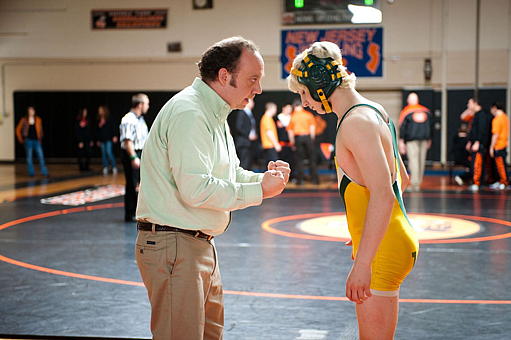By Peter Wertz · April 17, 2011

The notion of an anti-hero is so commonplace these days, finding a truly unflawed altruist in a film is nearly impossible. All the genuine heroes are delegated to fantasy, where characters are stereotypes, and often incapable of doing wrong. Win Win though presents us with an anomaly: A thoroughly nice guy, who has always done the right thing simply because he knows it to be right. Taking a character like this one through a moral gambit is the strongest puzzle piece in Director Thomas McCarthy's third film. While an audience will always root for a film's protagonist, it's hard not to feel personally invested when that protagonist is an authentic nice guy.
Mike Flaherty (Paul Giamatti) is the nice guy of interest, with a tough-talkin' wife Jackie (Amy Ryan), a man-child best friend Terry (Bobby Cannavale), and some serious cash-flow issues. Though he has built a life on good deeds, and is currently self-employed with his own geriatric (both literally and figuratively) law firm, the responsibilities have been piling up for years, coming to a head approximately now. One of Mike's clients, an older man named Leo Poplar (Burt Young), requires a guardian, a position which, thanks to Poplar's massive savings, comes with a $1500 a month payout. In a moment of weakness, Mike commits to the guardianship, places the old man in a nursing home, and lies to a few different people in the process. It is, as far as we can tell, the first wrong thing he has ever done. And you better believe that it comes back around.
What's interesting in Win Win is the way that the world itself seems to react to Mike's missteps. For instance, within minutes (movie time) of placing Leo in a nursing home, despite the older man's persistent desire to stay in his own home, a runaway 16-year-old shows up on Leo's doorstep, leaving Mike the only adult who can care for him. Leo's grandson Kyle (Alex Shaffer) is an entirely new set of problems. He has to eat and sleep somewhere, his mother is nowhere to be found, and despite his superhuman talent for wrestling, a sport Mike has invested years of coaching into and gotten little back from, Kyle is a loose cannon and an ingredient that Mike and Jackie were simply not prepared to add to their lives. It's not that giving a character a Job-like series of divine or karmic messes is a new idea; it's a story from the bible after all. But by making that man as good as Mike Flaherty is, by making his one indiscretion such a (relatively) minor one, the audience is invested in seeing him come out the other side. Even cynics want to believe in the good of people.
Win Win's other key strength is its ensemble. Obviously, Giamatti brings real, reliable talent to any film, but the surrounding characters are all fleshed out and true. Jackie is a mother hen, enveloping Kyle into her family slowly, but solidly and without compunction. On the topic of Kyle's absent, addict mom, "It's not my fault if I punch her in the face." Mike's childhood friend Terry is manic and desperate, dealing with his own problems by helping Mike deal with his. Terry is the guy who loved high school, and still resents having to grow up. He plays Wii and hangs in the basement with Kyle and his friends. In fact, for a film that attempts to deal with the persistent stress of raising a family in contemporary America, there is a surprising amount of humor in Win Win. Cannavale in particular gets the satisfaction of playing a character who is close to bottoming out, but his drama is off-screen, because this isn't his story. The freedom of an eccentric character who's not tied to one string of emotions must be a joy to play, because he is surely a joy to watch.
Win Win isn't this year's Little Miss Sunshine, as it lacks the cohesion and emotional resonance of that Cinderella story, and features a fairly significant character played by a kid who's never acted before. What it is though is a well-acted, well-written, considerate look at a group of people working towards something together, and a story about a man who wants nothing more than to make his family happy, whoever that family might end up including.
3.5 out of 4 stars.